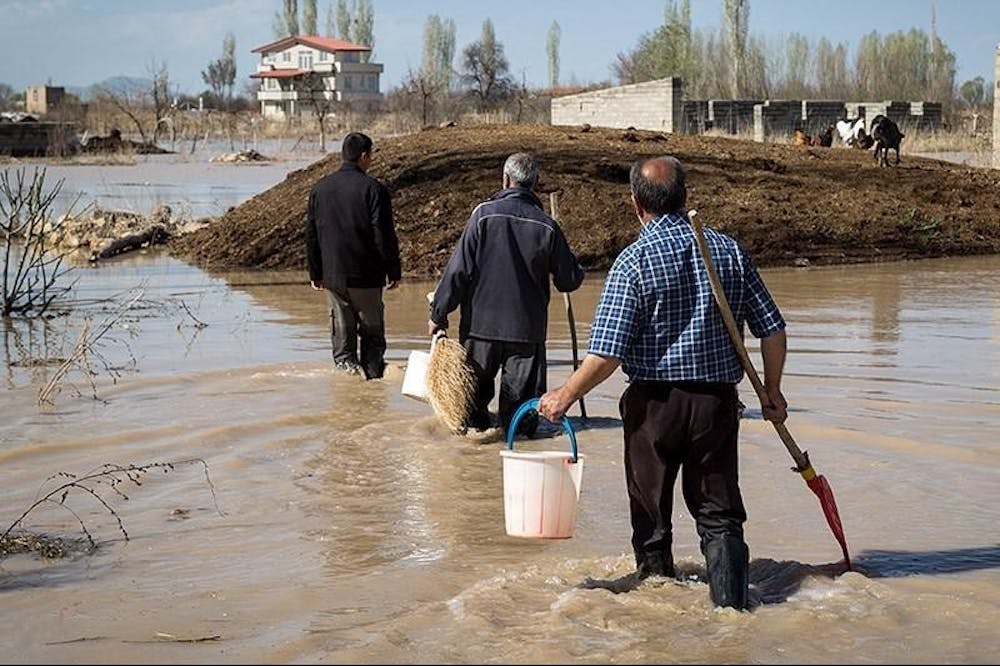On March 21, Iran faced its most devastating natural disaster since an earthquake that killed more than 500 people in November 2017. Flash floods caused by torrential downpours and overflowing rivers throughout the country have killed at least 24 people and left hundreds injured. 19 Iranians died in Shiraz, one of Iran’s most famous cities because of its ancient past and popular destinations for tourists. Five people died in the northern provinces of Mazandaran and Golestan.
Videos and eyewitness accounts of the natural disaster display muddy deluges rushing through city streets and horrifying images of Iranians clinging to cars, walls, and posts in the street to avoid being swept away by the torrential currents. After the floods calmed, the problem of stagnant, muddy water emerged, and the country is now attempting to devise a solution amidst relief effort.
Yet, reminiscent of the United States’ response to the 2017 earthquake, in America we hear nothing of this humanitarian and natural catastrophe falling upon the Iranian people. I even wrote a reflective piece in the aftermath of the earthquake two years ago, describing how our “hearts are seemingly uncaring when disaster strikes a particular people; our thoughts and prayers are selective.” Sadly, nothing has changed.
To my knowledge, President Trump has uttered no thoughts and prayers, no words of kindness or support or even acknowledgement for the Iranians currently facing the tides of death and destruction amidst the floods. Not a single American politician or candidate for president has made any gesture of solidarity with the suffering people. Cable news channels and print publications have largely ignored the story for ongoing discussion of the Mueller report. As was the case in November 2017, after one of the deadliest natural disasters of the entire year, America remains silent and ignores the pain, suffering, and existence of the Iranian people. With the case of Iran, this country has allowed politics to infuse our sense of humanity, charity, and dignity.
Two years ago, I called upon the Princeton community, the United States, and our society at large to seek out those suffering in our world, to acknowledge their pain, and to embrace the other in the face of forces that push us to disregard our common humanity. But there seems to exist something even more shocking, even more arresting about our current societal moment, particularly about how we view the Iranian people in America. Instead of pure ignorance, there lies a deep sense of actually relishing in their suffering.
At the American Israel Public Affairs Committee’s 2019 meeting just weeks ago, State Department official Brian Hook spoke at the conference and boasted that, because of the intense sanction regime of the Trump presidency, “Iran is facing its worst economic crisis in its 40-year history.”
In one of the most inhumane moments I’ve witnessed in recent memory with regards to American politics, the crowd then cheered and applauded the statement. Because of the current regime of crippling sanctions, Iranians are under one of the most stringent and crippling economic situations in the world and in their history. Iranians across the country struggle not only with financial troubles but also with shortages of essential supplies, such as food and life-dependent medicine and medical supplies. In response to this state of desperation and suffering, people at AIPAC cheered and applauded.
What these two responses demonstrate is a systematic ignorance, demonization, and dehumanization of the Iranian people in the eye of Americans in power. With regard to the United States’ own severe policy of economic sanctions against the country, we have an inherent inability to conceive of the debilitating and severe plight of life under such economic strangling. We cannot conceive that people are dying because they don’t have access to the medicine they need. Instead, Iran’s economic decline is seen as a political advantage for the United States. And somehow, we have allowed it to get to a level where dehumanization of Iranians in American political discourse is permitted and almost encouraged.
Even in the context of natural disasters and situations completely separated from the political situation between the two countries, the United States carries forward this air of hostility and dehumanization. The suffering of the Iranian people is not registered. They are systematically dehumanized and demonized, so that their pain is something to celebrate.
This state of affairs affects me deeply and in the most vulnerable aspects of my identity. As an Iranian-American, one must question the implications that this kind of behavior and neglect has for the future relationship between the United States and Iran. Will these tensions, this apparent contempt, ever recede? Will I ever live in a world where the two cultures of my identity live in harmony with one another on the world stage?
In times such as this, I find solace in the poetry of Iran, in the words of a people who have faced suffering, tragedy, and pain throughout the modern period amidst pride, love, and a beautiful appreciation for the nature of human life. Before the entrance of the United Nations Headquarters in New York, a large, magnificent rug hangs on the wall. A gift from the Iranian people, the rug is adorned with the poetry of the 13th century Persian poet Saadi:
“All human beings are members of one frame,

Since all, at first, from the same essence came.
When time afflicts a limb with pain
The other limbs at rest cannot remain.
If thou feel not for other’s misery
A human being is no name for thee.”
These verses that reside in the world’s symbolic center for unity, dialogue, and cooperation inspire me with hope. They remind me of the oneness of humanity and the essence we share as humans to feel, empathize, and lend our hearts to one another in times of grief and suffering. While the political and societal situation before us may be grim, there can be some relief in the poetic truths of Saadi.
These floods on March 21 fell on the Iranian celebration of Nowruz — the Persian New Year that commemorates the first day of spring. In Farsi, Nowruz translates to “new day” and its festivities embody the spirit of spring with decorations to symbolize life, rebirth, growth, good health, and happiness. Iranian-Americans and any people who value the dignity and humanity of all peoples must hope in times such as this for a “new day” sometime soon. A “new day” in which relations between the United States and Iran, between Americans and Iranians, reach a level of decency, respect, and maybe even compassion.
Kaveh Badrei is a junior Wilson School concentrator from Houston, Texas. He can be reached at kbadrei@princeton.edu.









